Cheery Families, c.1893
Cheery Families card game designed by Richard Doyle and printed by De La Rue & Co., Ltd, c.1893
Cheery Families by De La Rue & Co., Ltd, c.1890
Designed by Richard Doyle (1824-1883) and registered in 1893, the game was first issued with either dark green or pale green backs. This is De La Rue's contribution to the 'Happy Families' genre which had become popular following the publication of Jaques' Original Happy Families in c.1850. Richard Doyle also designed “Stop Thief” and “Spin & Old Maid” card games for De la Rue.
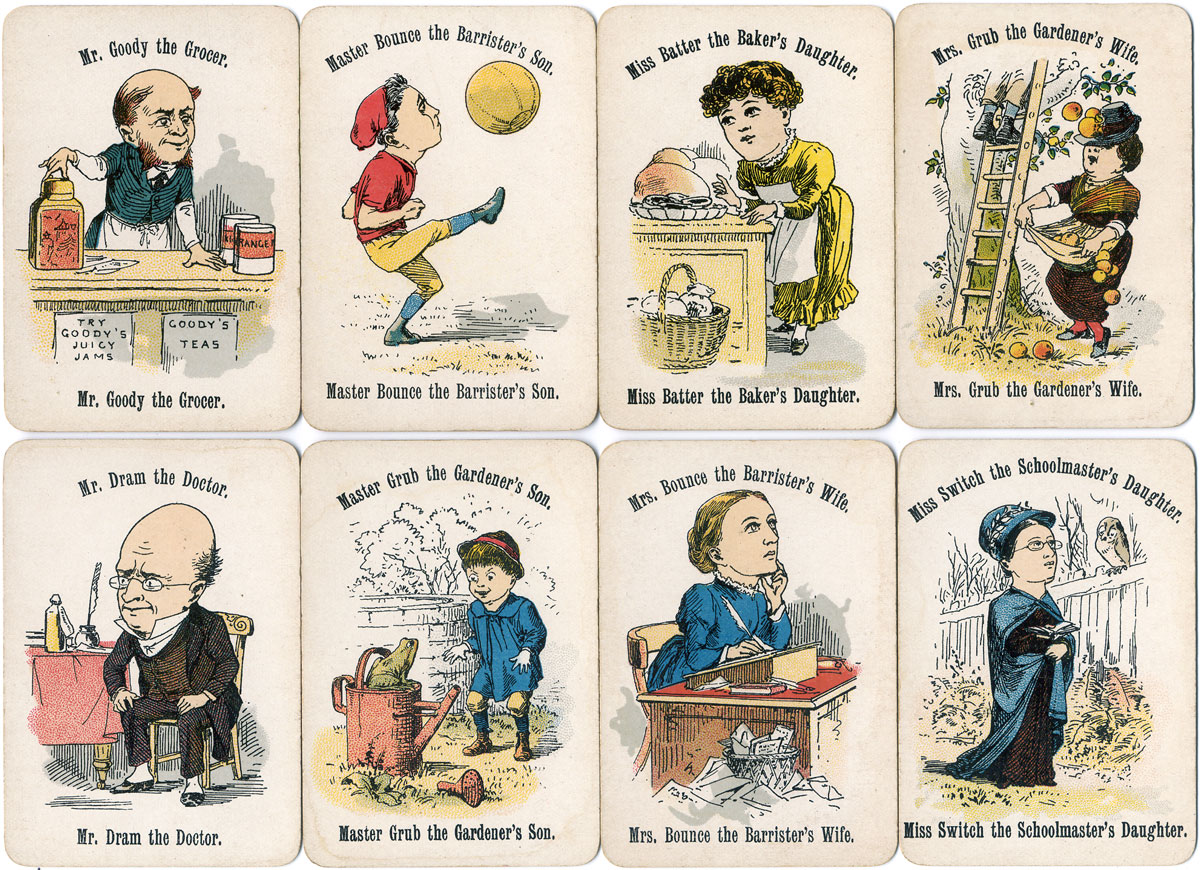
Above: eight cards from 'Cheery Families' card game printed by De La Rue & Co., Ltd, c.1893. 52 cards, 13 families of four cards each. The initials R.D. appear on Mr Grub the Gardener's flowerpot, which stand for Richard Doyle (1824-83), the humorous artist, cartoonist and illustrator.
Richard 'Dick Kitcat' Doyle (1824-1883) was uncle to Sir Arthur Conan Doyle. He was a gifted artist and began from an early age to illustrate juvenilia and books for family circulation. He went on to illustrate for Dickens, Thackeray, Ruskin and Punch magazine and became almost a household name. Doyle's cover design for Punch was used until 1954.
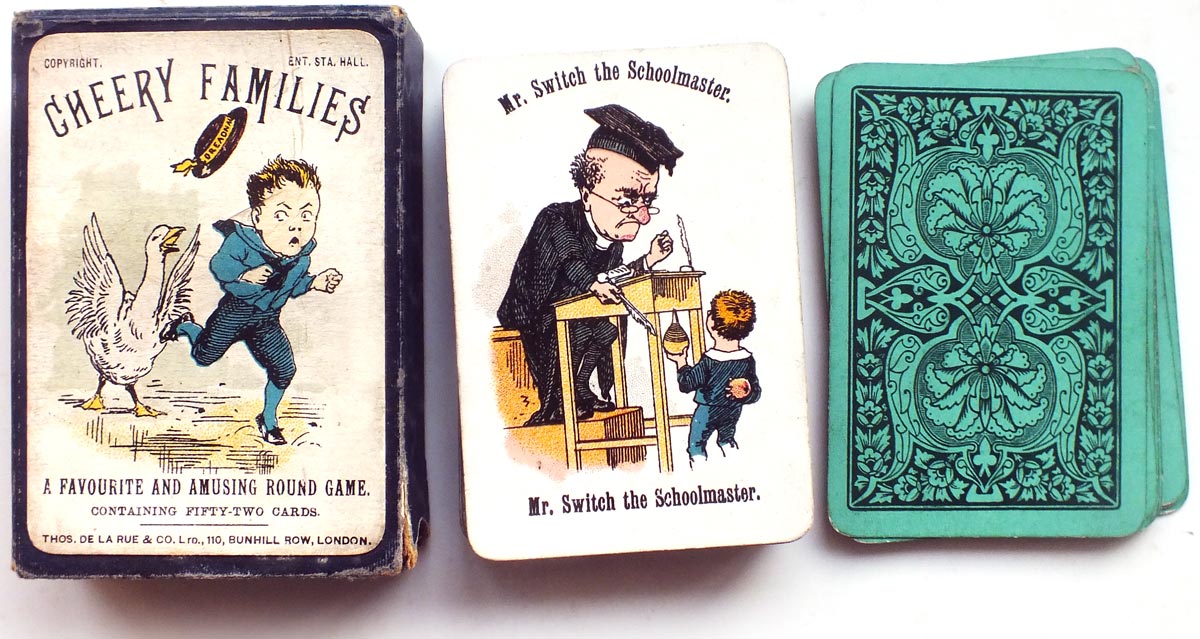
Above: the box.
Later Editions
In the late 1930s Gibson published a red and black version, renamed “Happy Families”, with blue pattern backs in 24 and 44 card editions. At some time near then Gibsons also published a 52 card edition for Marks and Spencer with the complete set of all the original characters (in the red and black colours) and a jazzy new back design. The same treatment was also applied to the De La Rue Snap cards contemporary with the Cheery Families.
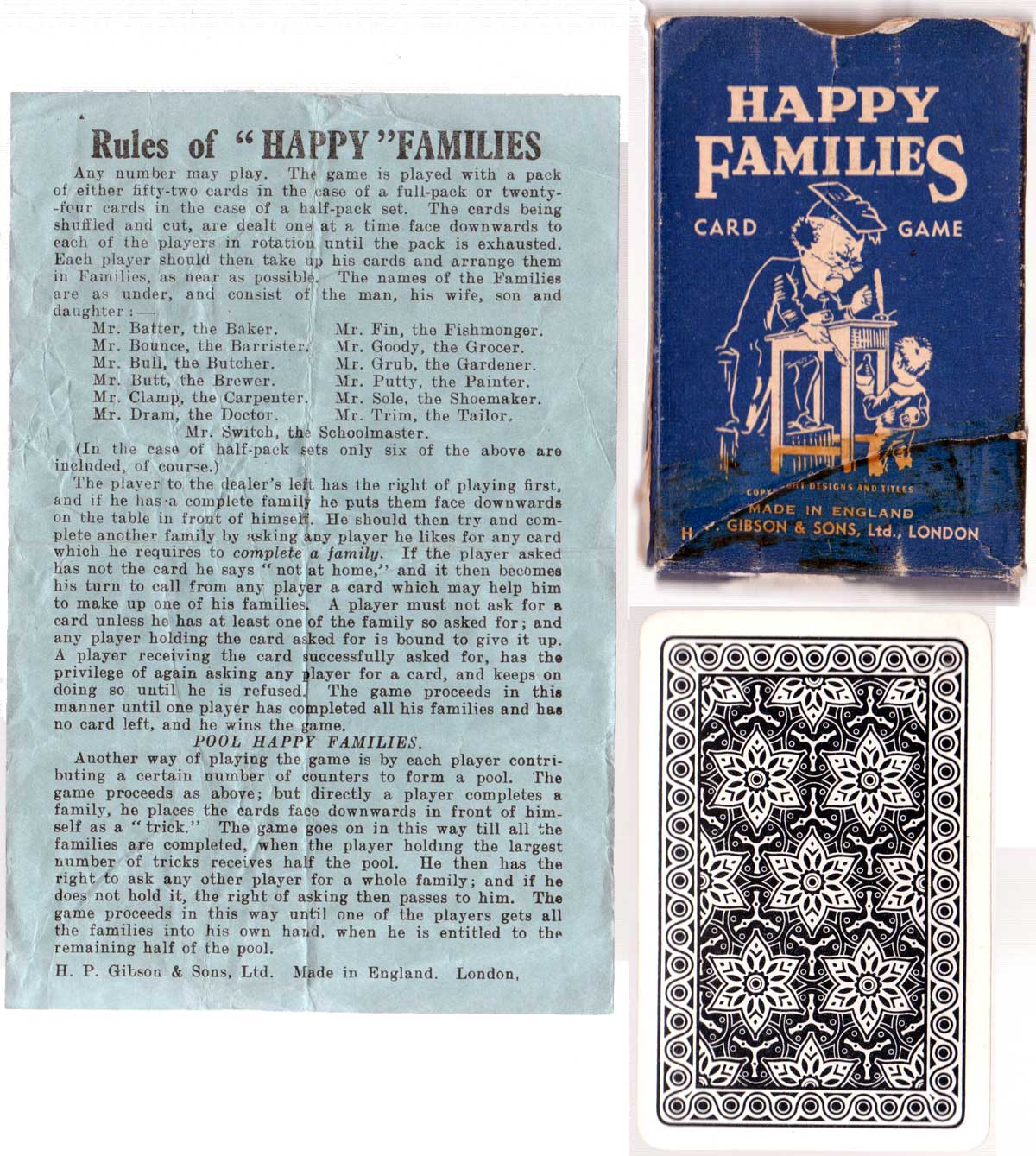
Above: 52 or 24-card version with rules, renamed “Happy Families”.
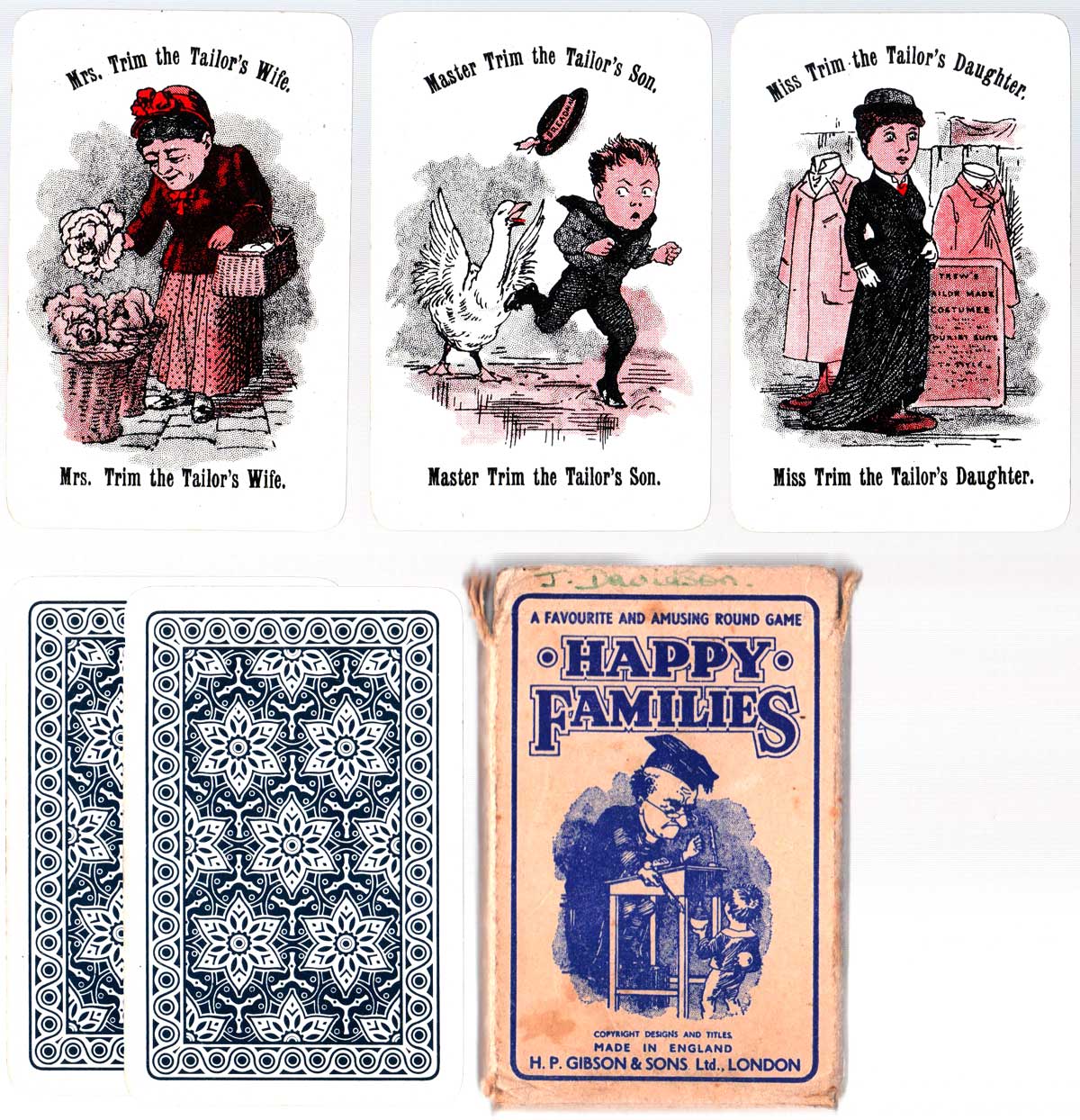
Above: 52-card version.
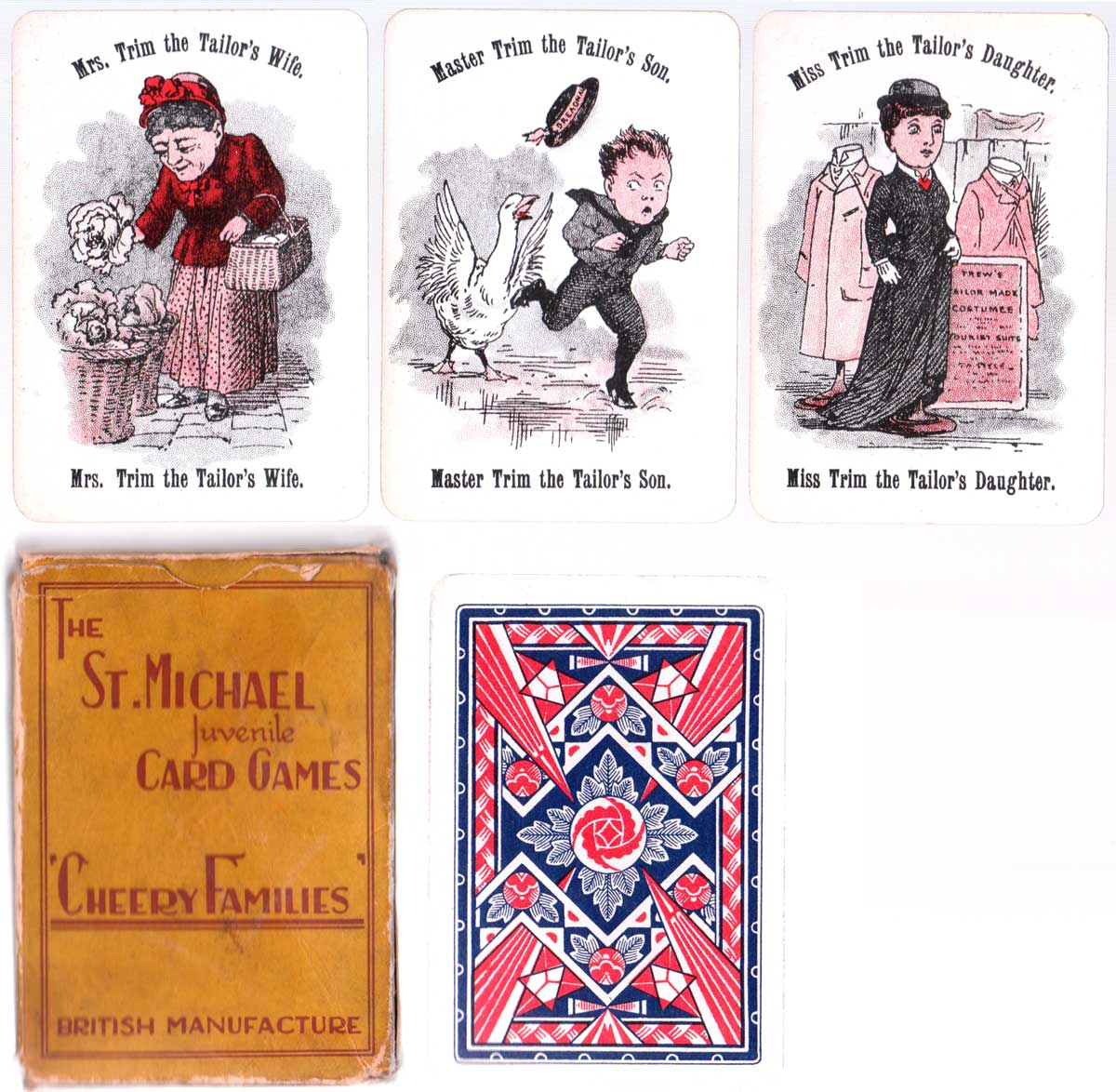
Above: Marks & Spencers edition, 52 cards in box.
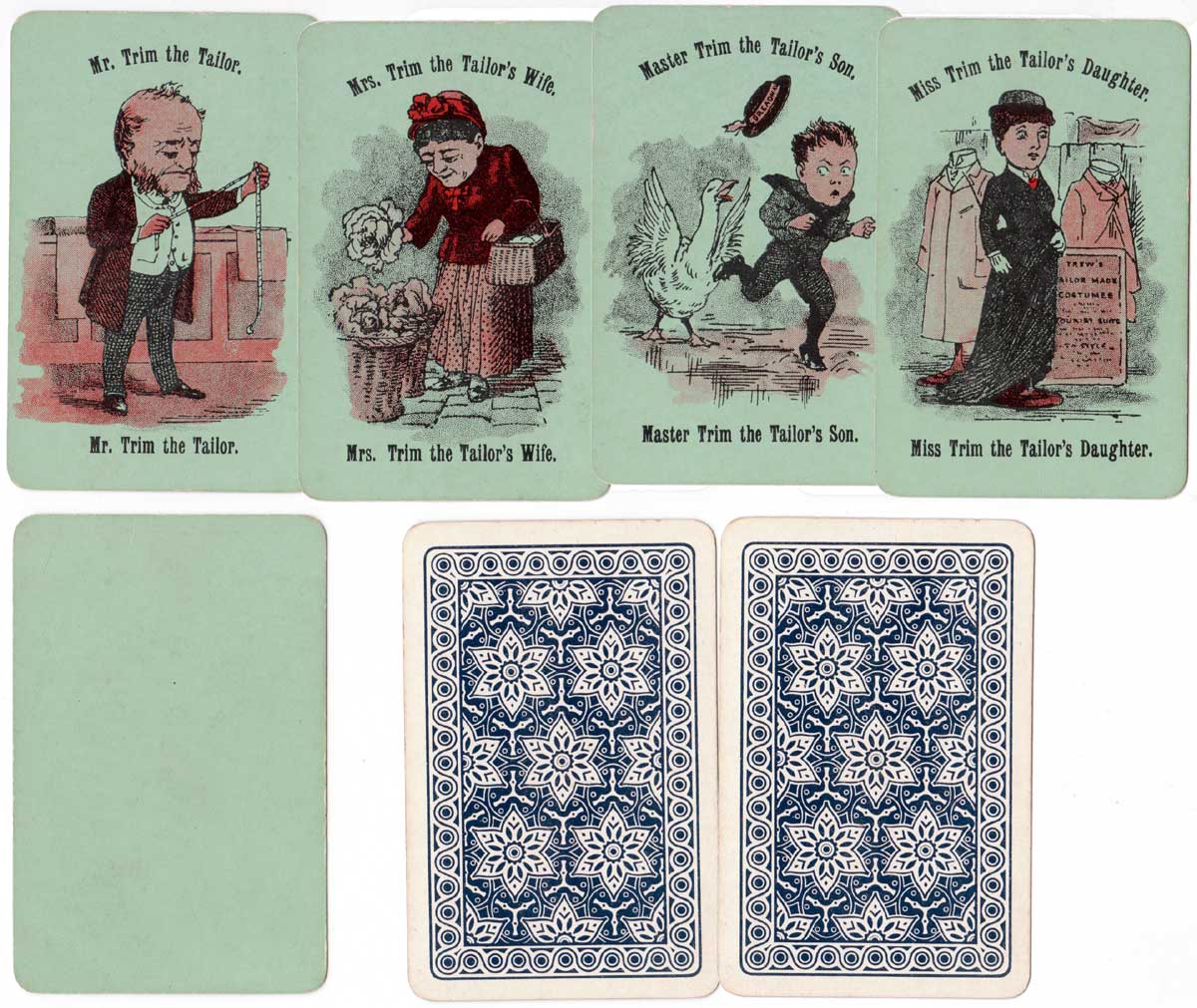
Above: an odd 44-card green version of Cheery Families economy edition printed by De La Rue & Co., Ltd, c.1930s.

By Rex Pitts (1940-2021)
Member since January 30, 2009
Rex's main interest was in card games, because, he said, they were cheap and easy to get hold of in his early days of collecting. He is well known for his extensive knowledge of Pepys games and his book is on the bookshelves of many.
His other interest was non-standard playing cards. He also had collections of sheet music, music CDs, models of London buses, London Transport timetables and maps and other objects that intrigued him.
Rex had a chequered career at school. He was expelled twice, on one occasion for smoking! Despite this he trained as a radio engineer and worked for the BBC in the World Service.
Later he moved into sales and worked for a firm that made all kinds of packaging, a job he enjoyed until his retirement. He became an expert on boxes and would always investigate those that held his cards. He could always recognize a box made for Pepys, which were the same as those of Alf Cooke’s Universal Playing Card Company, who printed the card games. This interest changed into an ability to make and mend boxes, which he did with great dexterity. He loved this kind of handicraft work.
His dexterity of hand and eye soon led to his making card games of his own design. He spent hours and hours carefully cutting them out and colouring them by hand.
Related Articles

Scientific Whist
“Scientific Whist” : standard cards with instructions for play on the faces by Chas Goodall & Son, 1...

Agent Provocateur
Branded lingerie collection in a pack of pin-up playing cards.

Nimbus playing cards
Mike Steer’s weather-themed pack with suits in four colours and backs for cardistry.

Agatha Christie and Playing Cards revisited
Agatha Christie uses card-play as a primary focus of a story, and as a way of creating plots and mot...

The Decadent Deck
Studies in the eroticism of the female body by Inge Clayton.

Historic Shakespeare
“Historic Shakespeare” playing cards featuring Shakespearean characters by Chas Goodall & Son.

Sunday Night / Nichiyoubi no Yoru
An irreverent, avant-garde deck unofficially titled "Nichiyoubi no Yoru" (Sunday Night), designed by...

Copechat Paramount Sorting System
Preserving the past: a specimen deck showcasing edge-notched cards and their ingenious sorting syste...

Heartsette by Herbert Fitch & Co, 1893
A glimpse into a busy print and design office in late Victorian London.

Emilio Tadini playing cards
Beautiful dreamlike playing card designs by Emilio Tadini.

Rap Rummy
Rap Rummy made by Parker Brothers in 1926, only 4 years after the discovery of King Tutankhamen’s to...

Batman® playing cards
Batman playing cards published by InterCol of London 1989.

Can You Believe Your Eyes?
“Can You Believe Your Eyes?” playing cards featuring visual illusions & other oddities.

Pastime Playing Cards for the Blind
The “Pastime” Playing Cards for the Blind manufactured by Goodall & Son Limd., c.1910.

Zürcher Festspiel 1903
Swiss-suited pack designed by Robert Hardmeyer featuring figures from art and politics.

The European Interchanges Quartets
A card game based around motorway intersections from European countries.
Most Popular
Our top articles from the past 28 days

